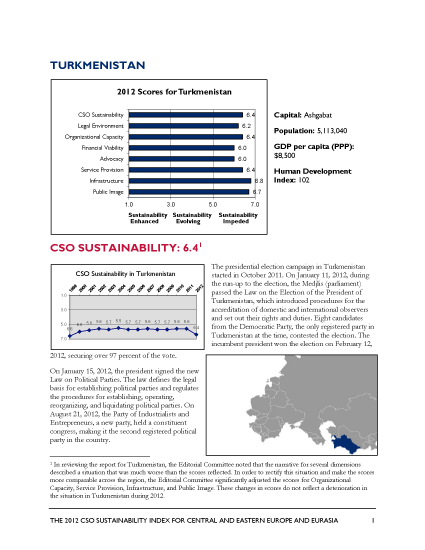CSO SUSTAINABILITY: 6.4
The presidential election campaign in Turkmenistan started in October 2011. On January 11, 2012, during the run-up to the election, the Medjlis (parliament) passed the Law on the Election of the President of Turkmenistan, which introduced procedures for the accreditation of domestic and international observers and set out their rights and duties. Eight candidates from the Democratic Party, the only registered party in Turkmenistan at the time, contested the election. The incumbent president won the election on February 12, 2012, securing over 97 percent of the vote.
On January 15, 2012, the president signed the new Law on Political Parties. The law defines the legal basis for establishing political parties and regulates the procedures for establishing, operating, reorganizing, and liquidating political parties. On August 21, 2012, the Party of Industrialists and Entrepreneurs, a new party, held a constituent congress, making it the second registered political party in the country.
The legal framework for CSOs in Turkmenistan did not change substantially in 2012, although there were fewer arbitrary decisions and delays in the registration process. The Law on Public Associations was discussed in 2008 and 2009 and the resulting recommendations were submitted to the government, but no changes have been made yet. The government also has not yet responded to the draft Law on State Social Orders proposed by CSOs.
The financial viability of the CSO sector is still constrained. Most public associations (PAs) cannot afford to employ paid staff or train their staff. Many CSOs rely on obsolete equipment that was purchased with grant funding in the early 2000s. CSOs do not form issue-based coalitions or engage in broad-based advocacy campaigns. CSO infrastructure continues to be minimal. CSOs suffer from a weak public image. Media largely ignores the sector and the wider public is not sufficiently aware of CSOs’ role or activities to form an opinion about the sector.
There are currently 106 PAs registered at the Ministry of Justice. They include sports entities, professional unions, organizations working to achieve common civil purposes, and government-organized public associations that represent government interests and receive governmental financial support and endorsement of their activities (GONGOs). The Ministry of Justice (Adalat) registered six new PAs in 2012, compared to none in 2011. Some CSOs register as business societies or individual enterprises at the Ministry of Economy and compete for grants to implement socially useful work. The number of unregistered community-based and other groups and activists is unknown.








Comment
Make a general inquiry or suggest an improvement.